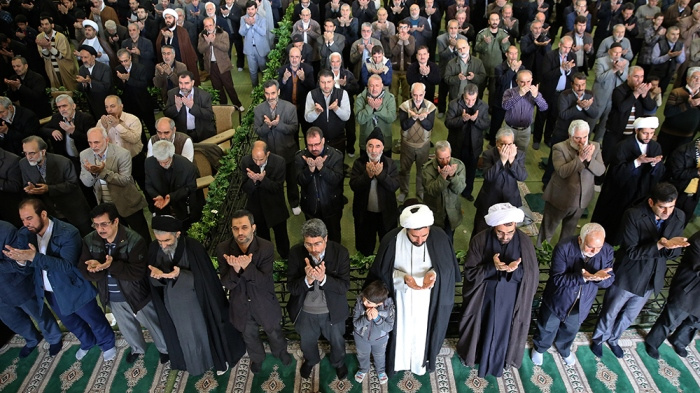Friday Prayers across Iran: Rejecting Reformists’ ‘national reconciliation’

(Tehran’s Friday prayers. Soroush Seyed Jamali/YJC.)
In their sermons across Iran, this week’s Friday prayers’ leaders echoed the Supreme Leader Ayatollah Khamenei in his recent speech, and rejected calls for ‘national reconciliation’, a campaign recently launched by Reformists to pave the way for rapprochement with the establishment and reintegration into the political system after the 2009 political unrest saw many of their major figures purged and pushed to the margins of Iranian politics.
In Tehran, Kazem Seddighi, leader of the Friday prayers scoffed at “those who do not believe in the foundations of the Revolution”, but call for national reconciliation. “People will never reconcile with you,” Seddighi said, although Reformists’ call was basically for rapprochement between the two main political factions of the Islamic Republic, not between the Reformists and citizens. Referring to massive turnout in February 10 rallies held across the country to celebrate the 38th anniversary of the Islamic Revolution as a sign of people’s support of the establishment, Seddighi slammed those who “inflicted irreparable damage on the people during the 2009 ‘sedition’”, i.e. the Green Movement, and criticized their insolence in calling for national reconciliation despite their record.
Mashhad Friday prayers’ leader Ahmad Alamolhoda was unsurprisingly more vitriolic in his criticism of calls for reconciliation. Indirectly referring to former president Reformist Mohammad Khatami, the main voice calling for reconciliation, as a “2009 sedition stooge”, the ultraconservative ayatollah said that it is not the nation that has got an estrangement problem, but “a political group that rejected popular vote in 2009” and launched unrest with support from “Western media corps, BBC war propaganda machine”, Obama and Britain.
“People will not forget the betrayal, desecration, and damage inflicted by leaders of sedition upon the country,” said the Friday prayers’ leader of Shiraz, Abolfazl Razavi-Ardakani. Razavi rejected any possibility of reconciliation, reminding his audience that leaders of the sedition have “neither repented nor abandoned their treacherous stance.” “National reconciliation was a remaking of 2009 sedition” said Mohammad Shahcheraghi, Friday prayers leader in Semnan, northern Iran. “Those who commited crimes on the day of Ashoura and beat members of the Basij will not see reconciliation from the people” he said.
IRD/66

